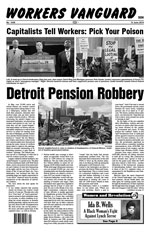
On East Ukraine (Letters) 23 May 2014 Dear Comrades, You write in “Right Sector Fascist Provocation at Leftist Event on Ukraine” [WV No. 1045, 2 May]: “We opposed the recent U.S.-backed Ukrainian coup that was spearheaded by the fascists and stand in opposition to the Kiev regime’s provocative military forays in eastern Ukraine. We oppose U.S./EU sanctions against Russia and the U.S./NATO military presence in the Baltics and elsewhere in East Europe. While giving no political support to Vladimir Putin’s Russian-chauvinist regime, we supported Russia’s intervention in Crimea, which allowed the people of that region to exercise their right of self-determination through reunification with Russia.” So far, so good. Crucially missing, however, from this description of your position regarding the current situation in eastern Ukraine are your stance with respect to the pro-Russian or secessionist forces there, on the one hand, and the Russian support for them, on the other. By not defining your stance on these two key issues, you allow your opponents to surmise what it would be, and they will not let this opportunity pass to smear you as is their custom. My own view is that, given the more heterogeneous nature of the population in eastern Ukraine (as compared to that in the Crimea), you should oppose the pro-Russian/secessionist forces and their Russian backers there to the same degree as you oppose “the Kiev regime’s provocative military forays in eastern Ukraine” and any U.S./EU/NATO meddling there. With comradely greetings,
WV replies: We addressed developments in eastern Ukraine subsequent to the article cited by B.R. in “U.S. Imperialism Behind Bloody Repression in Ukraine” (WV No. 1046, 16 May), which takes stock of the differences in the ethnic makeup of Crimea compared to that region. Crimea was historically a part of Russia and is majority ethnic Russian. Eastern Ukraine has a more mixed population, but it is heavily assimilated and Russified in terms of language and culture. There is a high degree of intermarriage of Russians and Ukrainians, with many people having both Russian and Ukrainian heritage. For example, according to one survey, in Donetsk province only 39 percent of the population considers itself Russian but a full 93 percent is Russian speaking; in Luhansk, the numbers are 55 percent and 89 percent, respectively. From day one of the coup spearheaded by forces from western Ukraine, Kiev made no secret of its virulent hostility toward ethnic Russians and Russian culture. An attempt was made to ban Russian and impose the Ukrainian language. In Donetsk, Luhansk and other eastern cities, protesters rose up, enraged by that move as well as the presence of virulently anti-Russian fascists in the government. Since then, Kiev’s repression has only escalated; it is now bombing cities and killing dozens of civilians. In the face of this military offensive and the accompanying fascist terror, revolutionary Marxists cannot remain neutral: the interest of the working class—in Ukraine, Russia and internationally—clearly lies in defense of the population of eastern Ukraine. The key fault line in Ukraine has long been between the three more rural and historically Uniate Catholic provinces in the west—a breeding ground of Ukrainian nationalism, including the fascists of Svoboda and Right Sector—and the heavily Russified, Russian-speaking and Orthodox east, where the bulk of industry is located. Although earlier polls suggested that a majority in the east wished to remain part of Ukraine while maintaining close ties with Russia, the hostility of the new Kiev regime has changed many minds. Sentiment in the east for separation may well harden under the repeated blows of the central government, which is gearing up, in the words of newly installed President Petro Poroshenko, one of the world’s richest men, to defend the country’s territorial integrity “no matter what.” The people of eastern Ukraine should be able to decide the fate of their region. The massive vote in the May 11 referendums in Donetsk and Luhansk provinces, while only a straw poll, strongly indicated a desire to pull away from Kiev’s control. We defend the democratic right of the population there to conduct the referendum and to act on the vote for “self-rule,” whether that entails pursuit of a federated Ukraine, independence or adhesion to Russia. This position does not constitute political support for the insurgent leadership, which is by all indications entirely wedded to capitalist rule. In fact, the new self-declared prime minister of the Donetsk People’s Republic, Alexander Borodai, is an ardent anti-Semitic Russian nationalist. Neither is our position dependent on the level of support accorded by Russian president Vladimir Putin to the “pro-Russian” forces. (In contrast to Crimea, where capitalist Russia acted on its perceived national interests by annexing the peninsula, Putin has at least for now publicly distanced himself from the insurgents in eastern Ukraine.) In our defense of that region’s population, we are guided by the approach of V.I. Lenin, who opposed all privileges for one people or nation with regard to another in order to foster the fighting unity of the multinational working class.
|
|
||||||||||||||||||||||||||||||||||||||||||||||||
